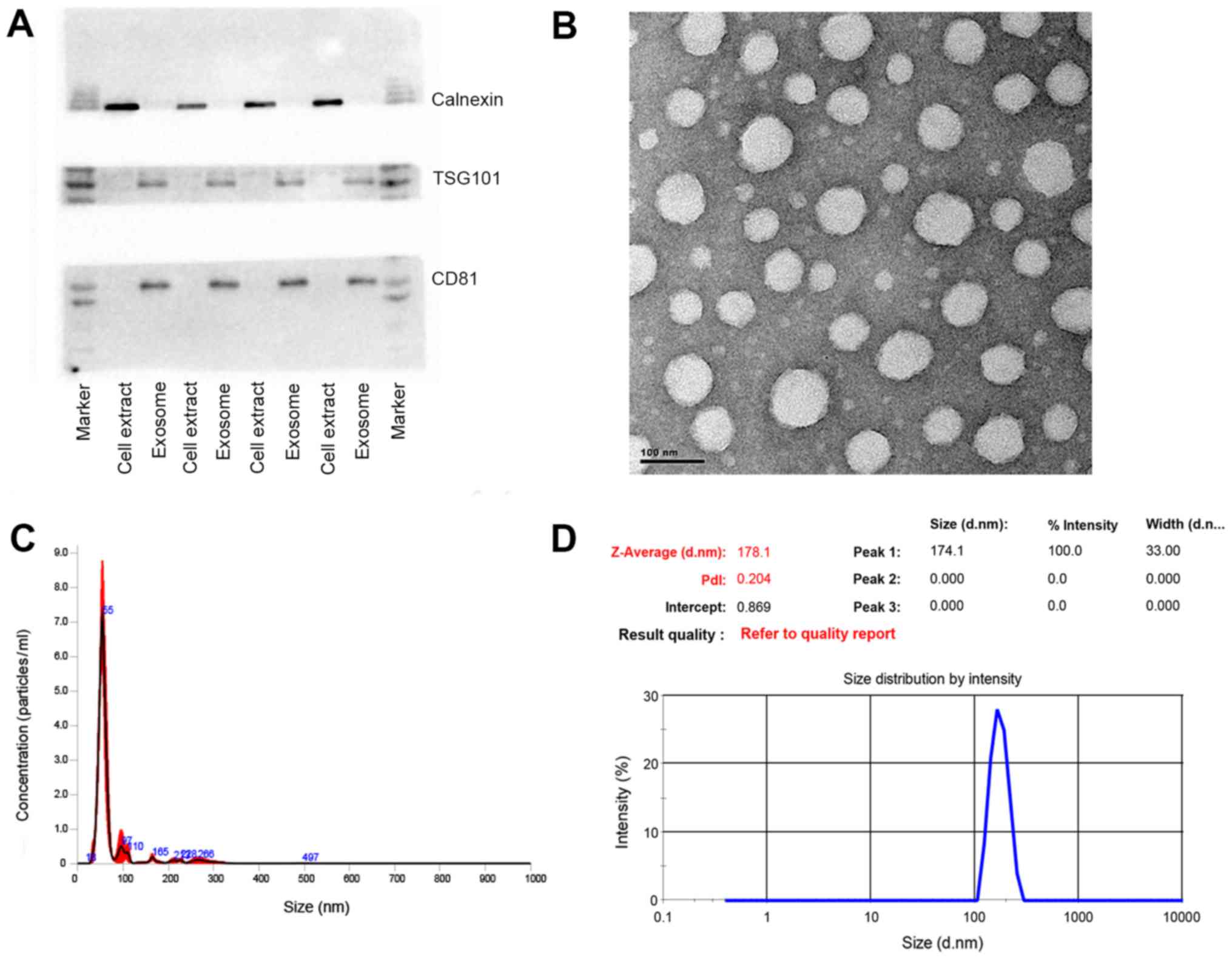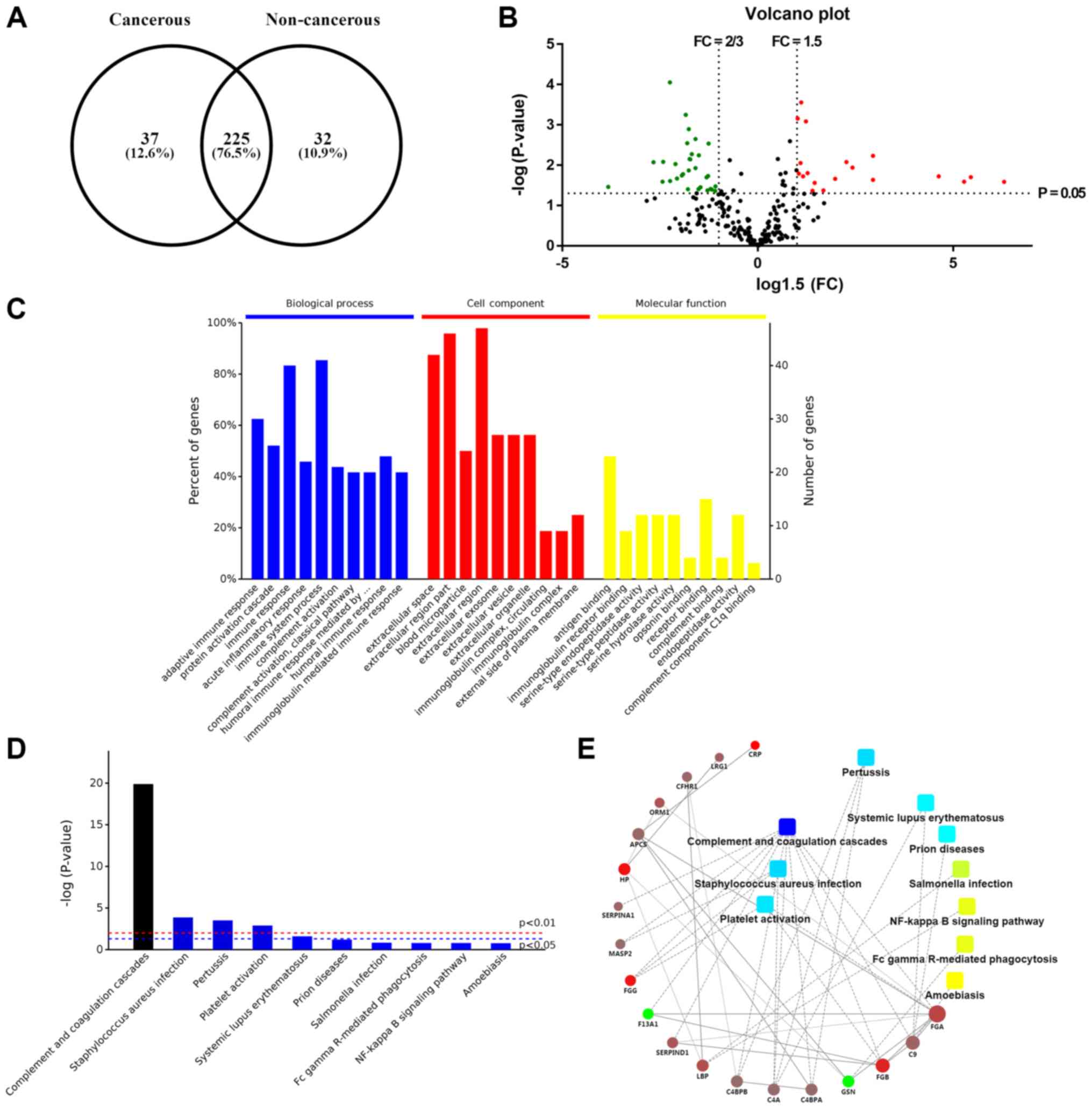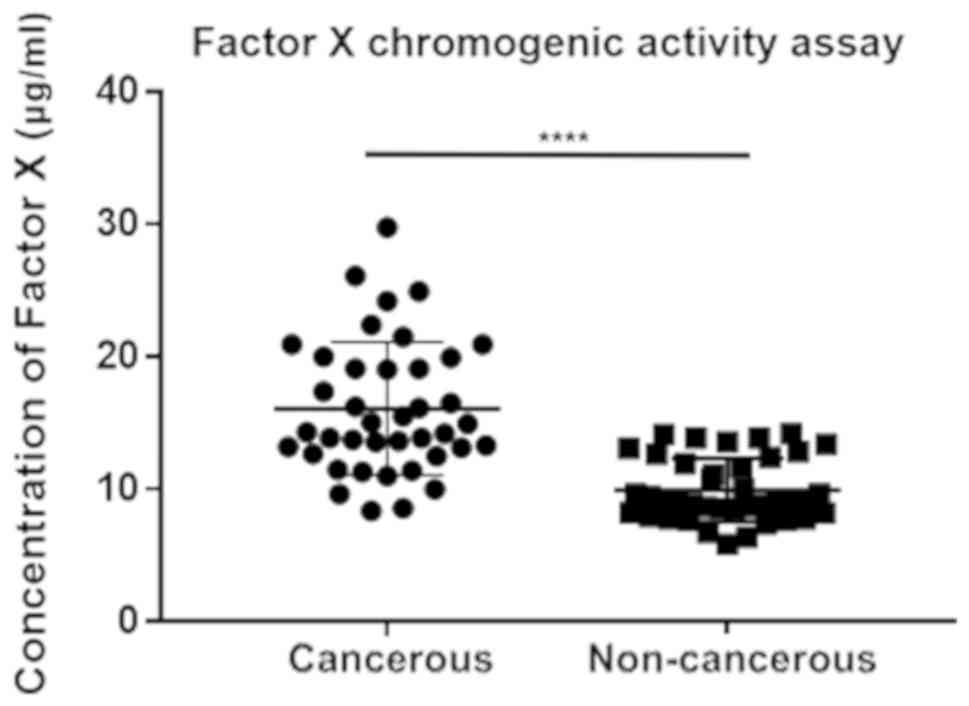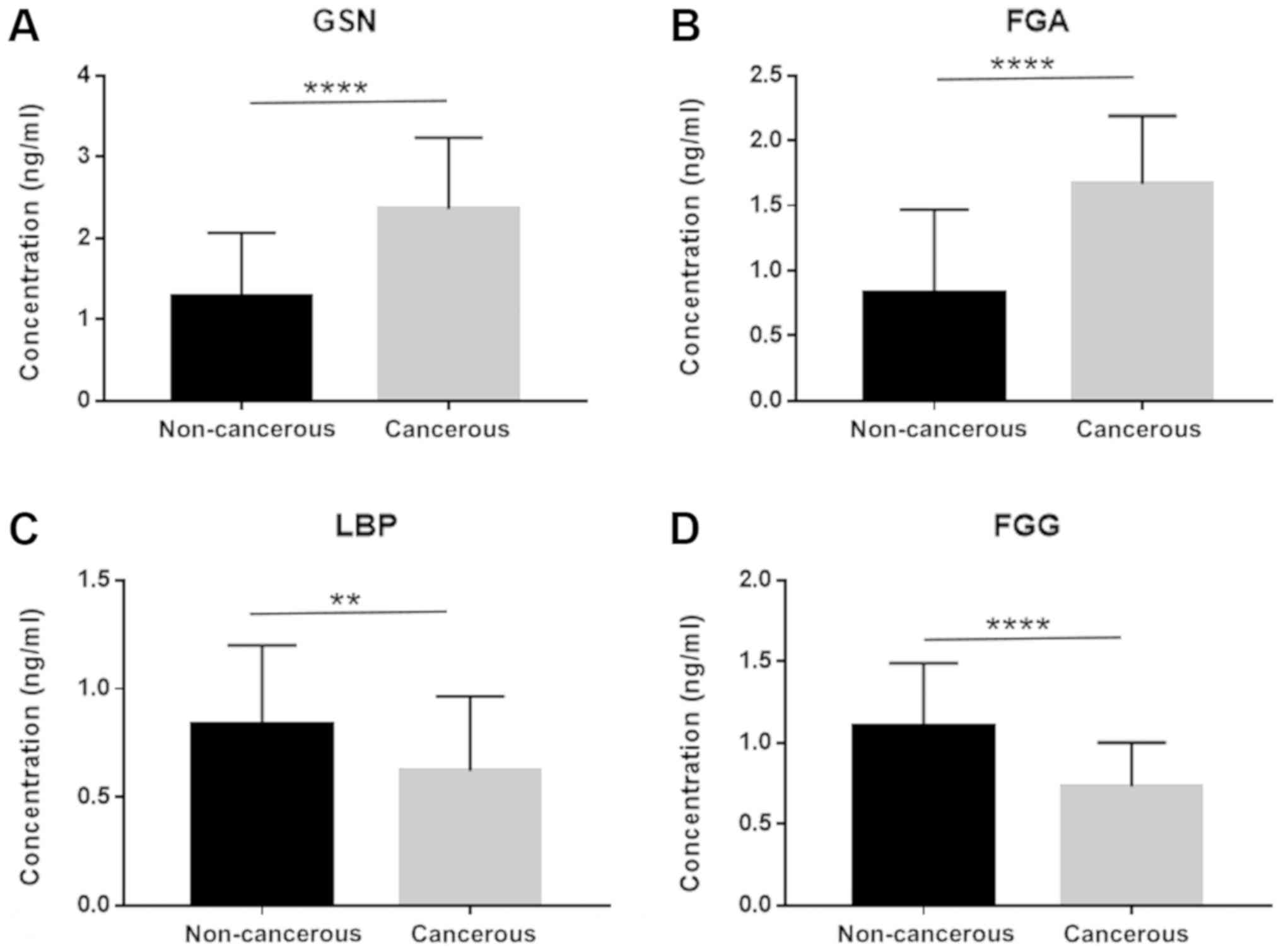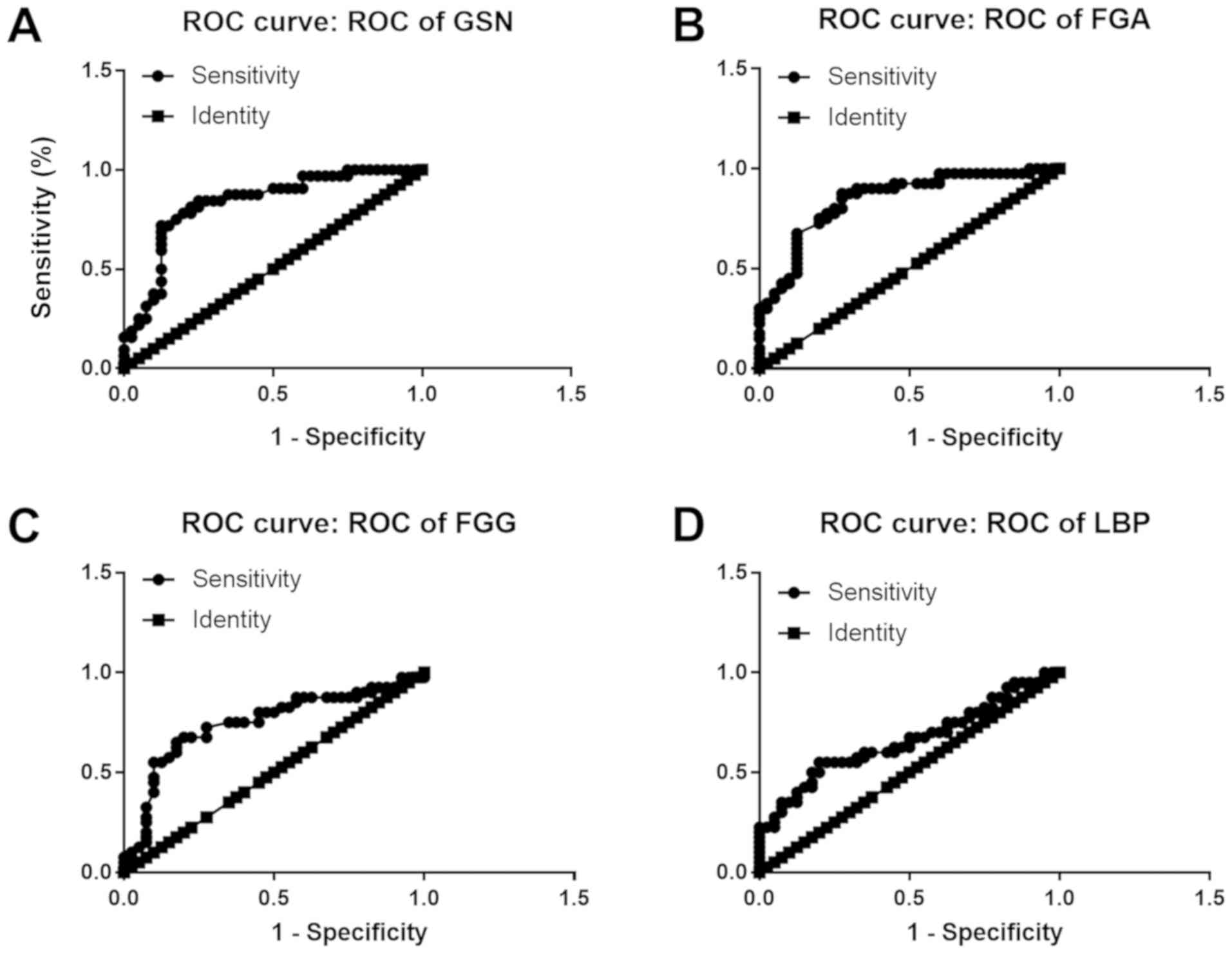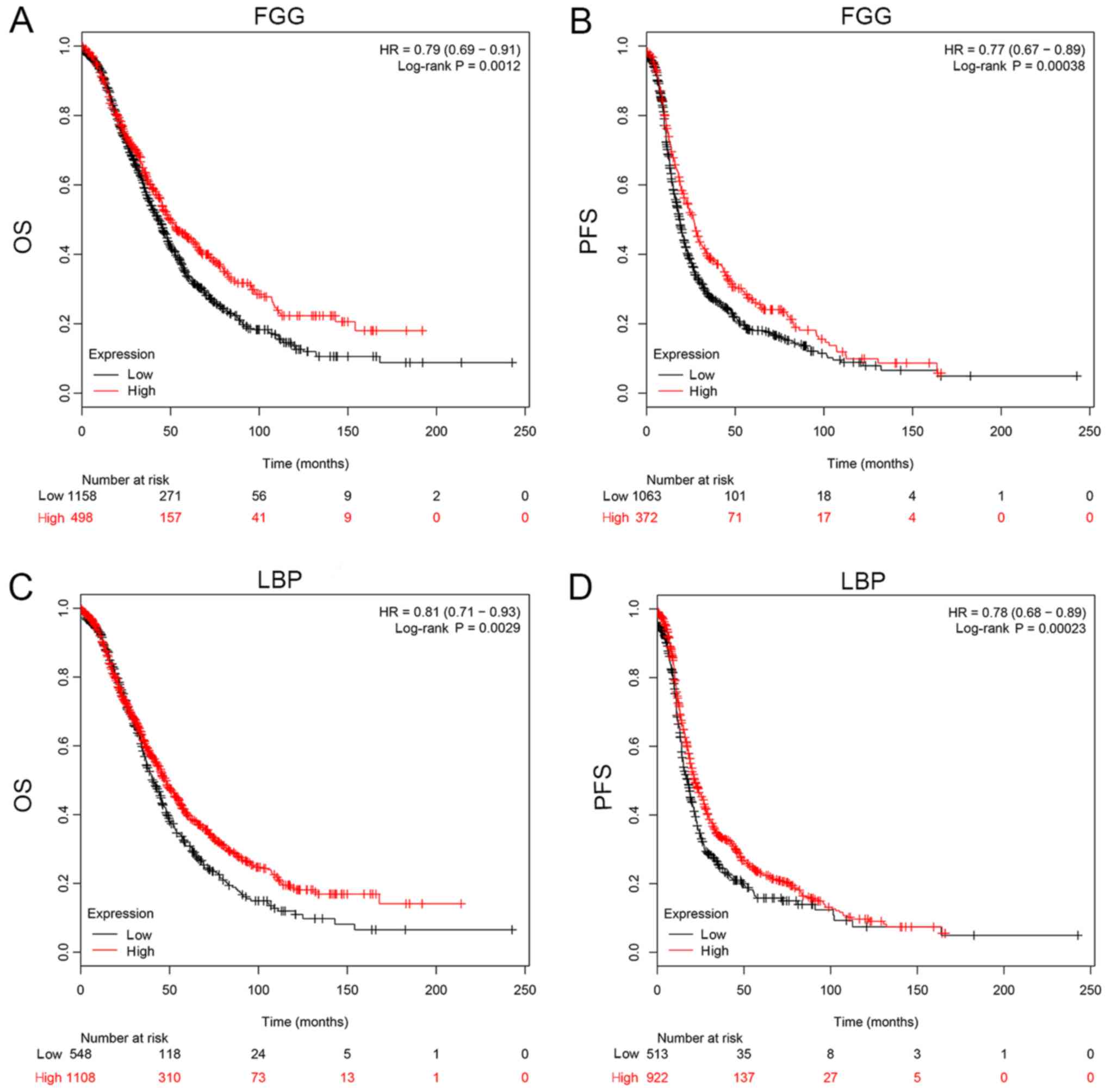|
1
|
Siegel R, Naishadham D and Jemal A: Cancer
statistics, 2012. CA Cancer J Clin. 62:10–29. 2012. View Article : Google Scholar : PubMed/NCBI
|
|
2
|
Jelovac D and Armstrong DK: Recent
progress in the diagnosis and treatment of ovarian cancer. CA
Cancer J Clin. 61:183–203. 2011. View Article : Google Scholar : PubMed/NCBI
|
|
3
|
Seidman JD, Horkayne-Szakaly I, Haiba M,
Boice CR, Kurman RJ and Ronnett BM: The histologic type and stage
distribution of ovarian carcinomas of surface epithelial origin.
Int J Gynecol Pathol. 23:41–44. 2004. View Article : Google Scholar
|
|
4
|
Melo SA, Luecke LB, Kahlert C, Fernandez
AF, Gammon ST, Kaye J, LeBleu VS, Mittendorf EA, Weitz J, Rahbari
N, et al: Glypican-1 identifies cancer exosomes and detects early
pancreatic cancer. Nature. 523:177–182. 2015. View Article : Google Scholar : PubMed/NCBI
|
|
5
|
Hoshino A, Costa-Silva B, Shen TL,
Rodrigues G, Hashimoto A, Tesic Mark M, Molina H, Kohsaka S, Di
Giannatale A, Ceder S, et al: Tumour exosome integrins determine
organotropic metastasis. Nature. 527:329–335. 2015. View Article : Google Scholar : PubMed/NCBI
|
|
6
|
Riches A, Campbell E, Borger E and Powis
S: Regulation of exosome release from mammary epithelial and breast
cancer cells - a new regulatory pathway. Eur J Cancer.
50:1025–1034. 2014. View Article : Google Scholar : PubMed/NCBI
|
|
7
|
Skogberg G, Lundberg V, Berglund M,
Gudmundsdottir J, Telemo E, Lindgren S and Ekwall O: Human thymic
epithelial primary cells produce exosomes carrying
tissue-restricted antigens. Immunol Cell Biol. 93:727–734. 2015.
View Article : Google Scholar : PubMed/NCBI
|
|
8
|
Pitt JM, Charrier M, Viaud S, André F,
Besse B, Chaput N and Zitvogel L: Dendritic cell-derived exosomes
as immunotherapies in the fight against cancer. J Immunol.
193:1006–1011. 2014. View Article : Google Scholar : PubMed/NCBI
|
|
9
|
Lugini L, Cecchetti S, Huber V, Luciani F,
Macchia G, Spadaro F, Paris L, Abalsamo L, Colone M, Molinari A, et
al: Immune surveillance properties of human NK cell-derived
exosomes. J Immunol. 189:2833–2842. 2012. View Article : Google Scholar : PubMed/NCBI
|
|
10
|
Cai Z, Yang F, Yu L, Yu Z, Jiang L, Wang
Q, Yang Y, Wang L, Cao X and Wang J: Activated T cell exosomes
promote tumor invasion via Fas signaling pathway. J Immunol.
188:5954–5961. 2012. View Article : Google Scholar : PubMed/NCBI
|
|
11
|
Barrès C, Blanc L, Bette-Bobillo P, André
S, Mamoun R, Gabius HJ and Vidal M: Galectin-5 is bound onto the
surface of rat reticulocyte exosomes and modulates vesicle uptake
by macrophages. Blood. 115:696–705. 2010. View Article : Google Scholar
|
|
12
|
Xiao H, Lässer C, Shelke GV, Wang J,
Rådinger M, Lunavat TR, Malmhäll C, Lin LH, Li J, Li L, et al: Mast
cell exosomes promote lung adenocarcinoma cell proliferation - role
of KIT-stem cell factor signaling. Cell Commun Signal.
12:642014.PubMed/NCBI
|
|
13
|
Welton JL, Khanna S, Giles PJ, Brennan P,
Brewis IA, Staffurth J, Mason MD and Clayton A: Proteomics analysis
of bladder cancer exosomes. Mol Cell Proteomics. 9:1324–1338. 2010.
View Article : Google Scholar : PubMed/NCBI
|
|
14
|
Choi DS, Lee JM, Park GW, Lim HW, Bang JY,
Kim YK, Kwon KH, Kwon HJ, Kim KP and Gho YS: Proteomic analysis of
microvesicles derived from human colorectal cancer cells. J
Proteome Res. 6:4646–4655. 2007. View Article : Google Scholar : PubMed/NCBI
|
|
15
|
Xiao GY, Cheng CC, Chiang YS, Cheng WT,
Liu IH and Wu SC: Exosomal miR-10a derived from amniotic fluid stem
cells preserves ovarian follicles after chemotherapy. Sci Rep.
6:231202016. View Article : Google Scholar : PubMed/NCBI
|
|
16
|
McKiernan J, Donovan MJ, O'Neill V,
Bentink S, Noerholm M, Belzer S, Skog J, Kattan MW, Partin A,
Andriole G, et al: A novel urine exosome gene expression assay to
predict high-grade prostate cancer at initial biopsy. JAMA Oncol.
2:882–889. 2016. View Article : Google Scholar : PubMed/NCBI
|
|
17
|
Andre F, Schartz NE, Movassagh M, Flament
C, Pautier P, Morice P, Pomel C, Lhomme C, Escudier B, Le Chevalier
T, et al: Malignant effusions and immunogenic tumour-derived
exosomes. Lancet. 360:295–305. 2002. View Article : Google Scholar : PubMed/NCBI
|
|
18
|
Inal JM, Kosgodage U, Azam S, Stratton D,
Antwi-Baffour S and Lange S: Blood/plasma secretome and
microvesicles. Biochim Biophys Acta. 1834:2317–2325. 2013.
View Article : Google Scholar : PubMed/NCBI
|
|
19
|
Severino V, Dumonceau JM, Delhaye M, Moll
S, Annessi-Ramseyer I, Robin X, Frossard JL and Farina A:
Extracellular vesicles in bile as markers of malignant biliary
stenoses. Gastroenterology. 153:495–504e8. 2017. View Article : Google Scholar
|
|
20
|
Sharma S, Gillespie BM, Palanisamy V and
Gimzewski JK: Quantitative nanostructural and single-molecule force
spectroscopy biomolecular analysis of human-saliva-derived
exosomes. Langmuir. 27:14394–14400. 2011. View Article : Google Scholar : PubMed/NCBI
|
|
21
|
Lau C, Kim Y, Chia D, Spielmann N, Eibl G,
Elashoff D, Wei F, Lin YL, Moro A, Grogan T, et al: Role of
pancreatic cancer-derived exosomes in salivary biomarker
development. J Biol Chem. 288:26888–26897. 2013. View Article : Google Scholar : PubMed/NCBI
|
|
22
|
Menay F, Herschlik L, De Toro J, Cocozza
F, Tsacalian R, Gravisaco MJ, Di Sciullo MP, Vendrell A, Waldner CI
and Mongini C: Exosomes isolated from ascites of T-cell
lymphoma-bearing mice expressing surface CD24 and HSP-90 induce a
tumor-specific immune response. Front Immunol. 8:2862017.
View Article : Google Scholar : PubMed/NCBI
|
|
23
|
Purushothaman A, Bandari SK, Liu J, Mobley
JA, Brown EE and Sanderson RD: Fibronectin on the surface of
myeloma cell-derived exosomes mediates exosome-cell interactions. J
Biol Chem. 291:1652–1663. 2016. View Article : Google Scholar :
|
|
24
|
Wen SW, Sceneay J, Lima LG, Wong CS,
Becker M, Krumeich S, Lobb RJ, Castillo V, Wong KN, Ellis S, et al:
The biodistri-bution and immune suppressive effects of breast
cancer-derived exosomes. Cancer Res. 76:6816–6827. 2016. View Article : Google Scholar : PubMed/NCBI
|
|
25
|
Taylor DD and Gercel-Taylor C: MicroRNA
signatures of tumor-derived exosomes as diagnostic biomarkers of
ovarian cancer. Gynecol Oncol. 110:13–21. 2008. View Article : Google Scholar : PubMed/NCBI
|
|
26
|
Peng P, Yan Y and Keng S: Exosomes in the
ascites of ovarian cancer patients: Origin and effects on
anti-tumor immunity. Oncol Rep. 25:749–762. 2011.
|
|
27
|
Li J, Sherman-Baust CA, Tsai-Turton M,
Bristow RE, Roden RB and Morin PJ: Claudin-containing exosomes in
the peripheral circulation of women with ovarian cancer. BMC
Cancer. 9:2442009. View Article : Google Scholar : PubMed/NCBI
|
|
28
|
Dayon L, Hainard A, Licker V, Turck N,
Kuhn K, Hochstrasser DF, Burkhard PR and Sanchez JC: Relative
quantification of proteins in human cerebrospinal fluids by MS/MS
using 6-plex isobaric tags. Anal Chem. 80:2921–2931. 2008.
View Article : Google Scholar : PubMed/NCBI
|
|
29
|
Thompson A, Schäfer J, Kuhn K, Kienle S,
Schwarz J, Schmidt G, Neumann T, Johnstone R, Mohammed AK and Hamon
C: Tandem mass tags: A novel quantification strategy for
comparative analysis of complex protein mixtures by MS/MS. Anal
Chem. 75:1895–1904. 2003. View Article : Google Scholar : PubMed/NCBI
|
|
30
|
Huang W, Sherman BT and Lempicki RA:
Systematic and integrative analysis of large gene lists using DAVID
bioinformatics resources. Nat Protoc. 4:44–57. 2009. View Article : Google Scholar
|
|
31
|
Szklarczyk D, Franceschini A, Wyder S,
Forslund K, Heller D, Huerta-Cepas J, Simonovic M, Roth A, Santos
A, Tsafou KP, et al: STRING v10: Protein-protein interaction
networks, integrated over the tree of life. Nucleic Acids Res 43D:.
D447–D452. 2015.
|
|
32
|
Shannon P, Markiel A, Ozier O, Baliga NS,
Wang JT, Ramage D, Amin N, Schwikowski B and Ideker T: Cytoscape: A
software environment for integrated models of biomolecular
interaction networks. Genome Res. 13:2498–2504. 2003. View Article : Google Scholar : PubMed/NCBI
|
|
33
|
Bader GD and Hogue CW: An automated method
for finding molecular complexes in large protein interaction
networks. BMC Bioinformatics. 4:22003. View Article : Google Scholar : PubMed/NCBI
|
|
34
|
Gyorffy B, Lánczky A and Szállási Z:
Implementing an online tool for genome-wide validation of
survival-associated biomarkers in ovarian-cancer using microarray
data from 1287 patients. Endocr Relat Cancer. 19:197–208. 2012.
View Article : Google Scholar : PubMed/NCBI
|
|
35
|
Wright M: Nanoparticle tracking analysis
for the multiparameter characterization and counting of
nanoparticle suspensions. Methods Mol Biol. 906:511–524.
2012.PubMed/NCBI
|
|
36
|
Chen X, Zhou J, Li X and Wang X, Lin Y and
Wang X: Exosomes derived from hypoxic epithelial ovarian cancer
cells deliver microRNAs to macrophages and elicit a tumor-promoted
phenotype. Cancer Lett. 435:80–91. 2018. View Article : Google Scholar : PubMed/NCBI
|
|
37
|
Matsuo K, Hasegawa K, Yoshino K, Murakami
R, Hisamatsu T, Stone RL, Previs RA, Hansen JM, Ikeda Y, Miyara A,
et al: Venous thromboembolism, interleukin-6 and survival outcomes
in patients with advanced ovarian clear cell carcinoma. Eur J
Cancer. 51:1978–1988. 2015. View Article : Google Scholar : PubMed/NCBI
|
|
38
|
Liang B, Peng P, Chen S, Li L, Zhang M,
Cao D, Yang J, Li H, Gui T, Li X, et al: Characterization and
proteomic analysis of ovarian cancer-derived exosomes. J
Proteomics. 80:171–182. 2013. View Article : Google Scholar : PubMed/NCBI
|
|
39
|
Yi H, Zheng X, Song J, Shen R, Su Y and
Lin D: Exosomes mediated pentose phosphate pathway in ovarian
cancer metastasis: A proteomics analysis. Int J Clin Exp Pathol.
8:15719–15728. 2015.
|
|
40
|
Sinha A, Ignatchenko V, Ignatchenko A,
Mejia-Guerrero S and Kislinger T: In-depth proteomic analyses of
ovarian cancer cell line exosomes reveals differential enrichment
of functional categories compared to the NCI 60 proteome. Biochem
Biophys Res Commun. 445:694–701. 2014. View Article : Google Scholar : PubMed/NCBI
|
|
41
|
Davalieva K, Kiprijanovska S, Komina S,
Petrusevska G, Zografska NC and Polenakovic M: Proteomics analysis
of urine reveals acute phase response proteins as candidate
diagnostic biomarkers for prostate cancer. Proteome Sci. 13:22015.
View Article : Google Scholar : PubMed/NCBI
|
|
42
|
Shi F, Wu H, Qu K, Sun Q, Li F, Shi C, Li
Y, Xiong X, Qin Q, Yu T, et al: Identification of serum proteins
AHSG, FGA and APOA-I as diagnostic biomarkers for gastric cancer.
Clin Proteomics. 15:182018. View Article : Google Scholar : PubMed/NCBI
|
|
43
|
Tokutomi K, Tagawa T, Korenaga M, Chiba M,
Asai T, Watanabe N, Takeoka S, Handa M, Ikeda Y and Oku N:
Decoration of fibrinogen γ-chain peptide on adenosine
diphosphate-encapsulated liposomes enhances binding of the
liposomes to activated platelets. Int J Pharm. 407:151–157. 2011.
View Article : Google Scholar : PubMed/NCBI
|
|
44
|
Duan S, Gong B, Wang P, Huang H, Luo L and
Liu F: Novel prognostic biomarkers of gastric cancer based on gene
expression microarray: COL12A1, GSTA3, FGA and FGG. Mol Med Rep.
18:3727–3736. 2018.PubMed/NCBI
|
|
45
|
Nishimura K, Ting HJ, Harada Y, Tokizane
T, Nonomura N, Kang HY, Chang HC, Yeh S, Miyamoto H, Shin M, et al:
Modulation of androgen receptor transactivation by gelsolin: A
newly identified androgen receptor coregulator. Cancer Res.
63:4888–4894. 2003.PubMed/NCBI
|
|
46
|
Schiewek J, Schumacher U, Lange T, Joosse
SA, Wikman H, Pantel K, Mikhaylova M, Kneussel M, Linder S,
Schmalfeldt B, et al: Clinical relevance of cytoskeleton associated
proteins for ovarian cancer. J Cancer Res Clin Oncol.
144:2195–2205. 2018. View Article : Google Scholar : PubMed/NCBI
|
|
47
|
Chen ZY, Wang PW, Shieh DB, Chiu KY and
Liou YM: Involvement of gelsolin in TGF-beta 1 induced epithelial
to mesenchymal transition in breast cancer cells. J Biomed Sci.
22:902015. View Article : Google Scholar : PubMed/NCBI
|
|
48
|
Abedini MR, Wang PW, Huang YF, Cao M, Chou
CY, Shieh DB and Tsang BK: Cell fate regulation by gelsolin in
human gynecologic cancers. Proc Natl Acad Sci USA. 111:14442–14447.
2014. View Article : Google Scholar : PubMed/NCBI
|
|
49
|
Chen R, Luo FK, Wang YL, Tang JL and Liu
YS: LBP and CD14 polymorphisms correlate with increased colorectal
carcinoma risk in Han Chinese. World J Gastroenterol. 17:2326–2331.
2011. View Article : Google Scholar : PubMed/NCBI
|
|
50
|
Van Dyke AL, Kemp TJ, Corbel AF, Zhu B,
Gao YT, Wang BS, Rashid A, Shen MC, Hildesheim A, Hsing AW, et al:
Lipopolysaccharide-pathway proteins are associated with gallbladder
cancer among adults in Shanghai, China with mediation by systemic
inflammation. Ann Epidemiol. 26:704–709. 2016. View Article : Google Scholar : PubMed/NCBI
|
|
51
|
González-Sarrías A, Núñez-Sánchez MA,
Ávila-Gálvez MA, Monedero-Saiz T, Rodríguez-Gil FJ, Martínez-Díaz
F, Selma MV and Espín JC: Consumption of pomegranate decreases
plasma lipopolysaccharide-binding protein levels, a marker of
metabolic endotoxemia, in patients with newly diagnosed colorectal
cancer: A randomized controlled clinical trial. Food Funct.
9:2617–2622. 2018. View Article : Google Scholar : PubMed/NCBI
|
|
52
|
Kovacs G, Peterfi L, Farkas N, Javorhazy
A, Pusztai C and Szanto A: Expression of inflammatory
lipopolysaccharide binding protein (LBP) predicts the progression
of conventional renal cell carcinoma - a short report. Cell Oncol
(Dordr). 40:651–656. 2017. View Article : Google Scholar
|
|
53
|
Wang N, Song X, Liu L, Niu L, Wang X, Song
X and Xie L: Circulating exosomes contain protein biomarkers of
metastatic non-small-cell lung cancer. Cancer Sci. 109:1701–1709.
2018. View Article : Google Scholar : PubMed/NCBI
|
|
54
|
Hsu YT, Osmulski P, Wang Y, Huang YW, Liu
L, Ruan J, Jin VX, Kirma NB, Gaczynska ME and Huang TH:
EpCAM-regulated transcription exerts influences on nanomechanical
properties of endometrial cancer cells that promote
epithelial-to-mesenchymal transition. Cancer Res. 76:6171–6182.
2016. View Article : Google Scholar : PubMed/NCBI
|
|
55
|
Turay D, Khan S, Diaz Osterman CJ, Curtis
MP, Khaira B, Neidigh JW, Mirshahidi S, Casiano CA and Wall NR:
Proteomic profiling of serum-derived exosomes from ethnically
diverse prostate cancer patients. Cancer Invest. 34:1–11. 2016.
View Article : Google Scholar :
|
|
56
|
An M, Lohse I, Tan Z, Zhu J, Wu J,
Kurapati H, Morgan MA, Lawrence TS, Cuneo KC and Lubman DM:
Quantitative proteomic analysis of serum exosomes from patients
with locally advanced pancreatic cancer undergoing
chemoradiotherapy. J Proteome Res. 16:1763–1772. 2017. View Article : Google Scholar : PubMed/NCBI
|
|
57
|
Chen Y, Xie Y, Xu L, Zhan S, Xiao Y, Gao
Y, Wu B and Ge W: Protein content and functional characteristics of
serum-purified exosomes from patients with colorectal cancer
revealed by quantitative proteomics. Int J Cancer. 140:900–913.
2017. View Article : Google Scholar
|















